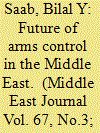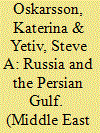| Srl | Item |
| 1 |
ID:
122168


|
|
|
|
|
| Publication |
2013.
|
| Summary/Abstract |
Political space is opening up in the Arab world. While it is particularly difficult to speak with any degree of confidence on the ultimate trajectory of the Arab uprisings (with all their local variants), the process of democratization that is sweeping the region is likely to have a significant impact on how Arab societies and their soon-to-be representative governments make and conduct foreign and defense policy in the future. One key area of concern is the subject of regional arms control and disarmament.
|
|
|
|
|
|
|
|
|
|
|
|
|
|
|
|
| 2 |
ID:
122164


|
|
|
|
|
| Publication |
2013.
|
| Summary/Abstract |
The Basij militia is a central component of Iran's clerical regime and a supporter of hard-line conservative interests. It is a security organization that also engages in social and political activism. This study focuses on the group's rank-and-file members and looks at the organization's mechanisms for recruitment, participation, and training. Based in part on interviews with current and former Basij members, the article concludes with general observations about the organization and its internal practices.
|
|
|
|
|
|
|
|
|
|
|
|
|
|
|
|
| 3 |
ID:
122167


|
|
|
|
|
| Publication |
2013.
|
| Summary/Abstract |
The economic offshoot of the Oslo Accords governing Israeli-Palestinian economic cooperation failed in 2000. The Paris Protocol, as it was known, has become increasingly irrelevant due to the Israeli closures policy, disengagement, and economic policies aimed at maintaining the status quo, asymmetry, and dependence in Israel-Palestine economic relations. This article argues that not only is a new version of the Protocol urgently required, but that it should facilitate cooperation on some final status issues, including the future of Palestinian refugees and the economic status of Jerusalem. The greatest threat to a new protocol is a lack of trust and security that stems from political issues, ongoing disputes over settlements, and the non-resolution of final status issues. For international donors such as the US, the price of peace stacked against tackling the accumulating economic cost of related conflicts, terrorism and regional insecurity will make even long term and sustained investment look favorable.
|
|
|
|
|
|
|
|
|
|
|
|
|
|
|
|
| 4 |
ID:
122166


|
|
|
|
|
| Publication |
2013.
|
| Summary/Abstract |
This article examines changes in Russia's diplomatic, trade, and energy relations in the Persian Gulf over time. Our data suggest that Russia's profile in the Persian Gulf is rising in the post-Cold War period. While Russian-Gulf state trade has not reached high levels, trade and energy cooperation have increased significantly. These changes do not mean that Russia has jettisoned strategic interests in the Middle East writ large - as its support of Syria, or to some extent Iran, may indicate - or that it no longer seeks to balance against Washington. But it appears that in the mix of its foreign policy motivations, trade and commerce with Arab Gulf states matter much more now than they did in the past. Should such ties continue to strengthen, they may give Russia greater reason to cooperate with Arab Gulf states on contentious regional issues.
|
|
|
|
|
|
|
|
|
|
|
|
|
|
|
|
| 5 |
ID:
122165


|
|
|
|
|
| Publication |
2013.
|
| Summary/Abstract |
The purpose of this article is to analyze the evolution of the Professors' Basij Organization (PBO) and its role in maintaining state control over Iranian universities. This study will examine why and how the PBO became involved in politics in general and in controlling Iranian universities in particular, and will discuss the implications of the expansion of the PBO at Iranian universities. While the PBO has been helping the Islamic regime control Iranian universities through different methods, including repressing the student movement and training a new cadre for the Islamic regime, it has transformed into one of the most influential organizations in Iran's political structure, especially after hardliners assumed power in 2005.
|
|
|
|
|
|
|
|
|
|
|
|
|
|
|
|